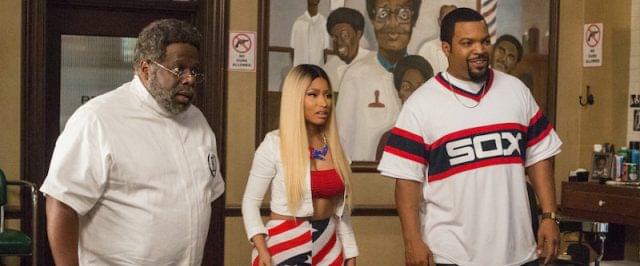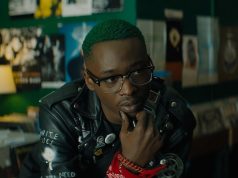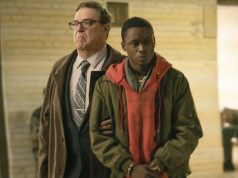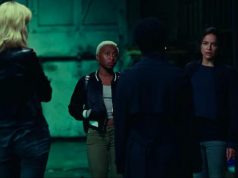
Spike Lee’s most recent movie, “Chi-Raq,” was a satirical comedy about efforts to curb gang violence in Chicago’s black neighborhoods. Not many people saw it (though it’s great — it made my top 10 list last year); like a lot of Spike Lee films, its anger makes it a tough sell. But by sheer coincidence, here comes “Barbershop: The Next Cut,” a mildly funny but wholly sincere comedy from Lee’s cousin, Malcolm D. Lee, that covers a lot of the same ground, but in a congenial, non-confrontational, we-don’t-have-the-answers-but-let’s-talk-about-it kind of way. Less effective, maybe, but certainly more palatable.
It’s a sequel to the “Barbershop” films from 2002 and 2004, though you don’t need to be familiar with them to enjoy the new one. (I was positive there hadn’t already been a sequel … until I stumbled across my review of it.) Calvin (Ice Cube) still runs his neighborhood barbershop, with old-timer Eddie (Cedric the Entertainer) cutting hair alongside him. Calvin has also added some new barbers — his old friend Rashad (Common), wry commentator Jerrod (Lamorne Morris), token non-African-American Raja (Utkarsh Ambudkar), and jack-of-all-trades hustler One-Stop (J.B. Smoove) — and expanded the business to include services for women’s hair, handled by responsible Angie (Regina Hall), slutty Draya (Nicki Minaj), and intelligent Bree (Margot Bingham).
The plot is a rambling, loose-knit thing, but the meat of it is that gun violence has gotten worse lately, and Calvin’s teenage son Jalen (Michael Rainey Jr.) and Rashad’s boy Kenny (Diallo Thompson) are starting to have contact with gang members in their everyday lives. As a symbolic gesture, Calvin makes his shop neutral ground for a 48-hour gang ceasefire, offering free haircuts to anyone who comes in, be they Blood, Crip, or unaffiliated. There are also subplots about Draya hitting on Rashad in front of Rashad’s wife (Eve), a local scammer (Anthony Anderson) trying to capitalize on the ceasefire, and Calvin’s internal conflict over whether to move the shop to a safer neighborhood.
Most of that is negligible. What makes the film work is the same thing that worked for the original “Barbershop”: colorful characters cracking on each other, telling stories, and discussing the problems of the black community and America in general. They talk about guns, racism, and the police, name-checking the men and boys who have sadly become symbols (Trayvon Martin, Tamir Rice, etc.). The women offer their perspective on the ongoing battle between “the good girls and the hoes” (some of which plays out right there in the barbershop), and about hair weaves and fake butts. Eddie earns some dark laughs joking about how much worse things used to be, claiming to have almost been lynched on two occasions: the first time, they couldn’t tie the knot; the second time, the tree wasn’t tall enough.
Written by Kenya Barris (creator of TV’s “Black-ish”) and Tracy Oliver, the film raises tough questions honestly, but of course it can only address them as deeply as its formula (Inoffensive Mainstream African-American Comedy) allows, yielding little insight. As well-meaning but insubstantial “issues” movies go, though, it’s a pleasant one, with a large, likable cast and a palpable respect for the community it represents. Filmmakers using cinema to explore humanity’s problems, even lightly, is what separates us from the animals, y’all.
B- (1 hr., 52 min.; )





